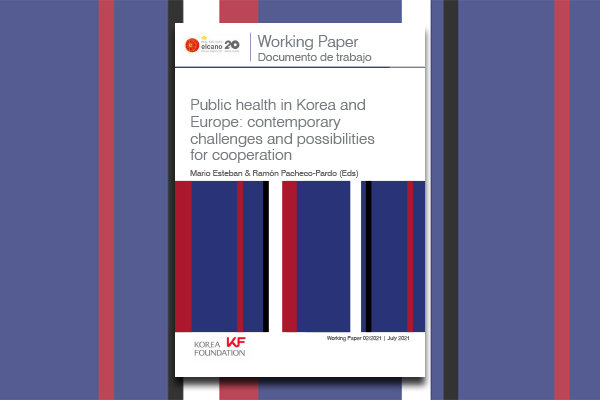
Summary
The lessons learnt from the COVID-19 pandemic point to the significant benefits in increasing cooperation on public health between Europe and South Korea to better prevent and address the future developments of this disease and of new trans-border infectious diseases. This enhanced cooperation on public health would not only benefit the peoples of Europe and South Korea, but have a global impact, since it could help improve global health governance and materialise in joint health cooperation projects in developing countries.
Nevertheless, the scope of cooperation between the EU’s institutions and South Korea in health matters is very limited as the EU’s role in public health is restricted by European treaties to complement the action of the states. This working paper covers the cooperation in public health between the EU member states and Korea. This was an underdeveloped area of cooperation before COVID-19 but intensified after the outbreak of the pandemic in Europe as the authorities looked East for partners with an effective record in managing the pandemic. South Korea’s mass testing strategy was praised throughout Europe and there was great interest in learning about its best practices to tackle COVID-19 and buying its immunological tests.
Introduction
Although the EU and South Korea have excellent political relations, strong public health systems and health cooperation plays a significant role in their foreign policies, health cooperation between them, including EU member states, has traditionally been quite limited. For example, although the EU and South Korea hold over 40 sectoral dialogues and forums, none of them focuses on public health. The lessons learnt from the COVID-19 pandemic point to the significant benefits in increasing cooperation on public health between Europe and South Korea to better prevent and address the future developments of this disease and of new trans-border infectious diseases. This enhanced cooperation on public health would not only benefit the peoples of Europe and South Korea, but have a global impact, since it could help improve global health governance and materialise in joint health cooperation projects in developing countries.
The COVID-19 pandemic has made painfully clear that public health is an international public good and that global international health governance has limitations to guarantee it in terms of preparedness and capacity to respond. Despite being aware that devastating pandemics strike mankind periodically, supply chains of drugs and medical equipment are unreliable, most countries do not have adequate reserves of pharmaceutical products and medical supplies, and international investment in new vaccines is insufficient.1 The response of the international community to the pandemic was hampered by an excessive politicisation for two reasons: its link with the management of globalisation and the geopolitical competition between China and the US. In a globalised world, the fight against infectious diseases is not only a public health issue. It also has obvious implications in the economic, political and security areas, as it requires managing risks inherent to globalisation such as the movement of people and goods. In addition, the pandemic was used by the US and Chinese authorities as a political weapon to erode the other’s image, even resorting to disinformation to do so. This great power rivalry had a significant impact on the governance of global health since the Trump Administration withdrew from the World Health Organisation (WHO), while China showed its ambition to extend its influence within the organisation. This, together with the unilateral response of many national authorities, which raced to secure doses for their domestic population and made no significant efforts to coordinate a global strategy against the pandemic, severely constrained potential international cooperation for tackling COVID-19.
In this context, it is particularly urgent that stakeholders committed to multilateralism such as the EU and South Korea take an active role in international health governance. The EU and South Korea have pledged to work together and through multilateral institutions such as the UN, WHO, WTO (the Ottawa Group) and G20 to support each other and also less developed countries in response to COVID-19.2 Doing so, they have also supported the WHO’s leading role in coordinating the fight against the pandemic. In addition, both sides are united in their efforts to develop vaccines and treatments to be used for their respective citizens as well as for those living in vulnerable countries. Hence their participation in COVAX, which is particularly significant in the EU’s case, to ensure universal access to tests, therapies and vaccines to counter COVID-19.
Despite some differences –for example criticism by South Korea’s Foreign Minister of the EU’s ‘vaccine nationalism’ when Brussels threatened to stop vaccine exports as a reaction to the reduction in the doses delivered by Astra-Zeneca due to its agreement with the Commission–,3 leaders of both the EU and the Republic of Korea believe that the COVID-19 pandemic will highlight both sides’ shared values and strengthen their already existing strategic partnership. In responding to the current health crisis, during the EU-Korea summit in June 2020 they noted several ways of increasing cooperation: (1) increasing response capacities through coordination and information sharing by the health authorities; (2) offering mutual support in gaining access to medical products and cooperating in medical research and development projects; and (3) ensuring that there is a global response to the crisis where international organisations play a role and that vulnerable countries do not get left behind.4 More recently, in a February 2021 Joint Committee meeting, the EU and South Korea reaffirmed along the same lines the importance of being prepared for the possibility of future COVID-19 outbreaks, mutations/changes in the behaviour of the virus and other health crises.5
Nevertheless, the scope of cooperation between the EU’s institutions and South Korea in health matters is very limited as the EU’s role in public health is restricted by European treaties to complement the action of the states. Therefore, this working paper also covers the cooperation in public health between the EU member states and Korea. This was an underdeveloped area of cooperation before COVID-19 but intensified after the outbreak of the pandemic in Europe as the authorities looked East for partners with an effective record in managing the pandemic. South Korea’s mass testing strategy was praised throughout Europe and there was great interest in learning about its best practices to tackle COVID-19 and buying its immunological tests.
The remainder of this working paper is divided into four chapters. In the first, Professor Seonjou Kang presents a South Korean perspective on health cooperation with the EU, underlining how bilateral cooperation on vaccine development and production, pandemic response and consultation mechanisms for pandemics could serve as steppingstones to global initiatives that could increase the capacity of the international community to prevent and manage future pandemics. In the second chapter, Ramón Pacheco-Pardo analyses the prospects for new venues for health cooperation between the EU and South Korea and between the EU and North Korea. Cooperation with South Korea is much more promising than with North Korea and could improve their capacity to address pandemics and even the global health governance system. The third chapter, written by Oskar Piertrewicz and Carolin Wefer, deals with public health cooperation between EU member states and South Korea during the COVID-19 pandemic through the examples of Germany and the Visegrad countries. Since health, including the management of health risks and crisis, is the competence of the member states, the chapter focuses on practical cooperation in these fields. The fourth chapter concludes and summarises the main findings of the previous three.
Mario Esteban
Senior Analyst at the Elcano Royal Institute and Associate Professor at the Autonomous University of Madrid | @wizma9
Ramón Pacheco-Pardo
Associate Professor at King’s College and KF-VUB Korea Chair | @rpachecopardo
1 Michael T. Osterholm & Mark Olshaker (2020), ‘Chronicle of a pandemic foretold’, Foreign Affairs, vol. 99, nr 10.
2 European External Action Service (2020), ‘10 years of the EU-Republic of Korea’.
3 Oscar Williams-Grut (2021), ‘DAVOS 2021: Japan and Korea attack EU’s vaccine nationalism’, Yahoo Finance UK.
4 European Council (2020), ‘Republic of Korea-EU leaders’ video conference meeting, 30 June 2020’.
5 European External Action Service (2021), ‘EU-Republic of Korea: 17th Joint Committee’, Press Release.
Public health in Korea and Europe. Mario Esteban & Ramón Pacheco-Pardo (Eds). Elcano Royal Institute




